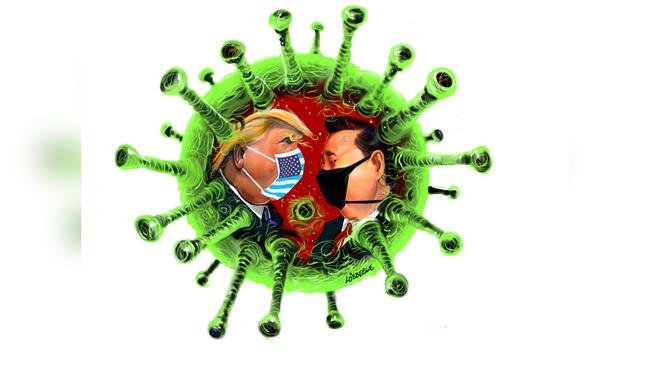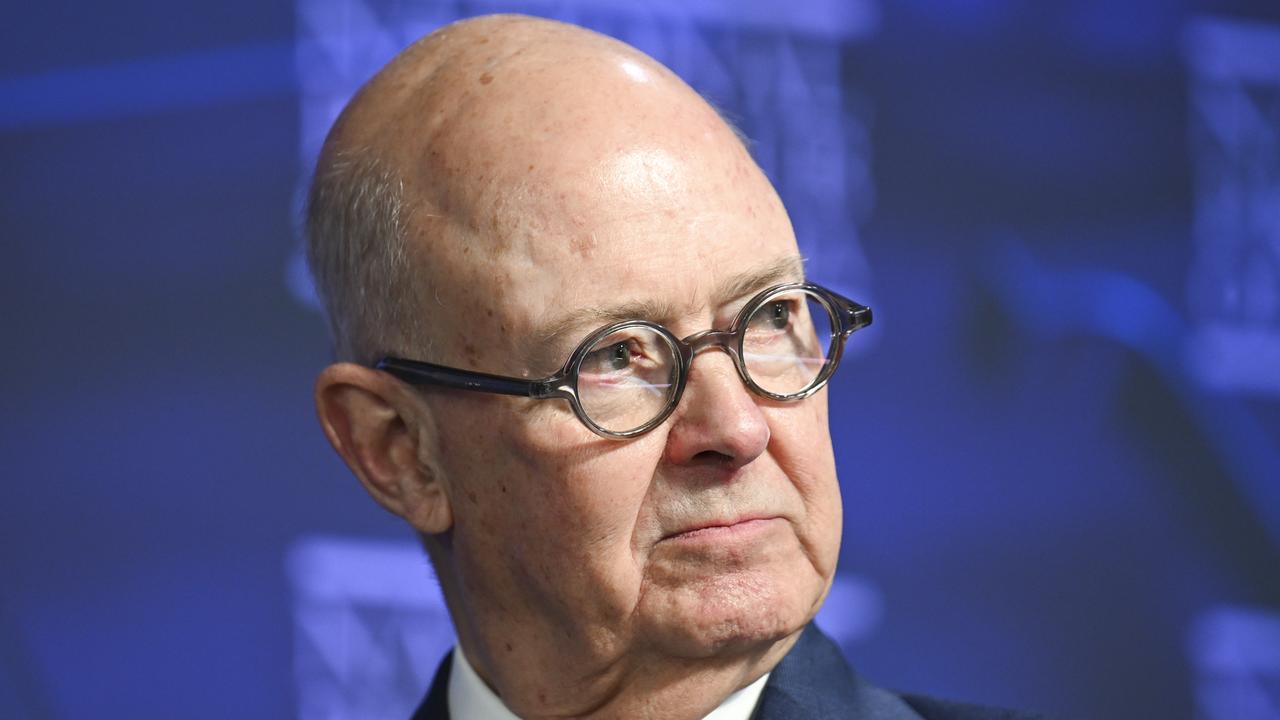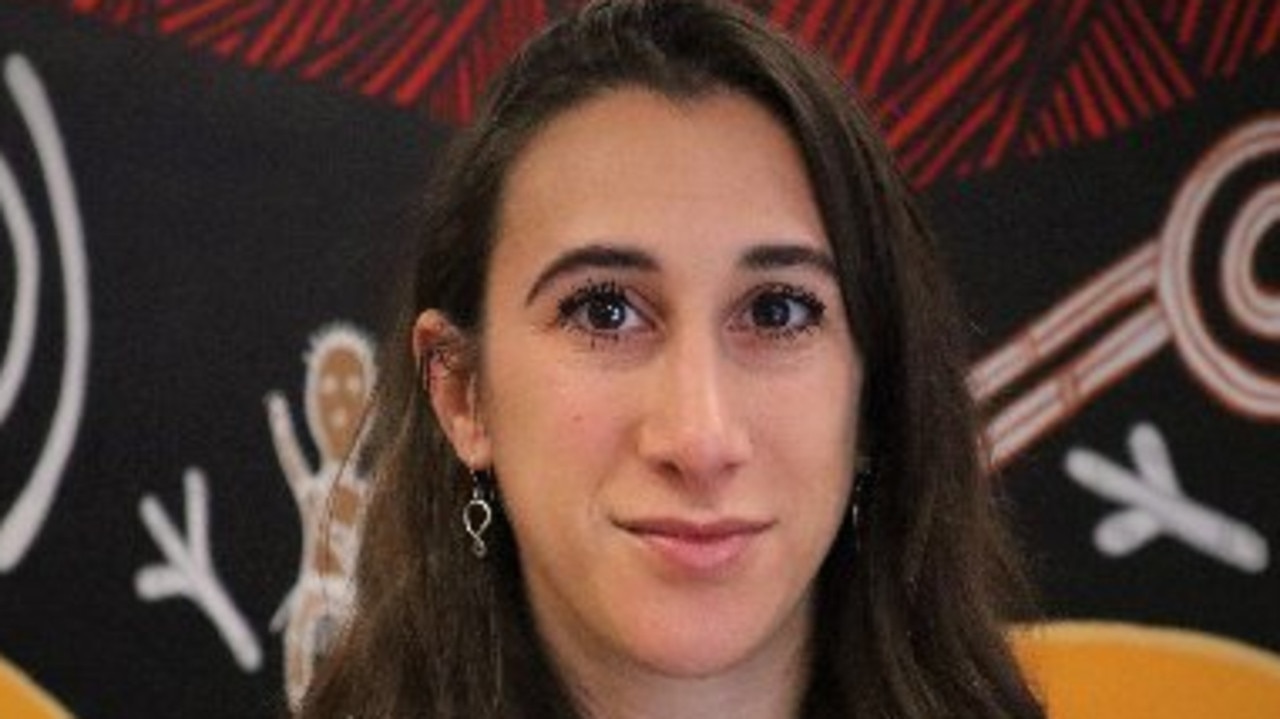Coronavirus: It’s masks on, gloves off for Trump and Xi
The blame game with Beijing could work perfectly for the US President’s insular, ‘America first’ politics.

A vicious competition, propaganda war and nationalistic blame game has been unleashed between China and the US as their relations nosedive and the struggle against COVID-19 — affecting virtually every nation — becomes decisive in 21st-century global leadership.
National leaders, China’s Xi Jinping and America’s Donald Trump, have both launched domestic campaigns with megaphones to the world seeking to discredit each other’s countries in a test of their rival ideological systems, ability to save their own people and offer an example to the world.
Current trends suggest more Americans than Chinese will die from COVID-19, a virus that originated in China. It is hard to imagine a more incendiary political package for Trump who brands the pandemic a “China virus” to deflect responsibility as the US health system falters amid a rising death toll.
Beijing, meanwhile, is rewriting the story of the virus — for China and against the US. China’s state system has launched a blatant global campaign, part propaganda, part practical action, burying its initial responsibility for the virus and casting itself as the pandemic saviour. In an age when truth is disputed, this looms as an epic battle over truth.
These leaders now inflame nationalistic sentiment against each other to save their power and reputation. The politics of the virus will make or break Trump’s presidency. Who really knows about Xi’s position? The certainty is that he has faced his most dangerous event as China’s President and has moved into opportunistic mode.
The ramifications for the rest of the world will be enormous. Even given Trump’s ineptitude the balance of cynicism in Australia post-virus is sure to move public sentiment in a strong anti-China direction, making bilateral engagement far more difficult and qualified.
China expert and Lowy Institute senior fellow Richard McGregor told Inquirer: “Both sides are looking for a scapegoat and they see it in each other. Astoundingly, given where we were a month ago, China might emerge from the crisis more strongly than the US. The Chinese economy is still reeling but at least they can see the light at the end of the tunnel. The US, by contrast, starting at the top, is bungling the crisis.
“This matters for the rest of the world including Australia. For China, the competition with the US is not just about geopolitics and trade. It is a contest of political systems. If China comes out ahead, its leaders will feel bulletproof and emboldened, just as they were after the GFC. They will be more aggressive in pursuing their regional ambitions. By contrast, America’s crisis of confidence will get worse and the fiscal pressures for a reduced military footprint around the world will be greater.”
This global health crisis should have seen the two major powers working together. That happened during the 2008-09 GFC. Now it is impossible. Weaker international co-operation is a threat to the world. Perhaps the early trend will be checked. But as McGregor says, US-China trust “already at a low, is falling through the floor” and “the push to decouple their economies is strengthening”, which means more difficult choices for Australia in terms of technology, trade and strategy.
Former US assistant secretary of state Kurt Campbell and Brookings Institution China strategy director Rush Doshi, in a joint article in Foreign Affairs, say: “When no European state answered Italy’s urgent appeal for medical equipment and protective gear, China publicly committed to sending 1000 ventilators, two million masks, 100,000 respirators, 20,000 protective suits and 50,000 test kits. China has also dispatched medical teams and 250,000 masks to Iran and sent supplies to Serbia whose President dismissed European solidarity as a ‘fairy tale’ and proclaimed ‘the only country that can help us is China’.
“Beijing’s edge in material assistance is enhanced by the simple fact that much of what the world depends on to fight the coronavirus is made in China. The US, by contrast, lacks the supply and capacity to meet many of its own demands, let alone to provide aid in crisis zones elsewhere.”
This is the context for Scott Morrison’s statement to the G-20 leaders’ hook-up that “our Pacific Island family must be a focus of international support”. He said: “There has never been a more important time for Australia’s Pacific step-up as we all face these massive challenges.” This is a humanitarian need. It will inevitably involve China. But anything China does in the Pacific will have strategic consequences for Australia.
A danger sign for Australia that the populist right and sections of the conservative side of politics will fuse the China threat with disastrous demands for Australia to turn history back to the forlorn days of a protectionist, quasi-Fortress Australia.
Historian James Curran, from the University of Sydney, told Inquirer: “Those pushing the China threat narrative in Australia are already conflating the coming of the virus with older rhetoric about a Fortress Australia. These are short-term judgments made out of the emotion of the moment and Morrison will need to ensure such voices do not sidetrack him.”
The consequences for Australia will be alarming if the US is dangerously weakened by a flawed response to the virus and China gains yet another advantage in their rivalry. Note that Trump’s poll ratings have improved in the past week despite his blunders in managing the crisis. The scenario of Trump being re-elected on a more nationalistic anti-China platform cannot be overlooked.
Another dramatic event has been Trump’s extraordinary political pivot this week. While Boris Johnson has gone Churchillian putting Britain into lockdown, Trump has gone for appeasement. He hopes to be reopening the economy by Easter, he said, some states ahead of others. “We cannot let the cure be worse than the problem itself,” he tweeted, contradicting his medical advice. At his media conference on Friday, Trump said upwards of a dozen times that “our people want to go back to work, I’m hearing it loud and clear”.
Bill Gates put Trump back in his box, saying: “It’s tough to say to people ‘Hey, keep going to restaurants, go buy new houses, ignore the pile of bodies in the corner’.” Anti-Trump Washington Post columnist Max Boot said: “I want to scream: you are not going to sacrifice my older friends and relatives on the altar of the Dow Jones Industrial Average!”
This is a huge gamble if Trump follows through and actually reboots some of the economy. Does it work or does it prolong the virus in America and thereby play into Xi’s hands?
Dramatising their concerns Campbell and Doshi say if the US cannot rise to this historic crisis “the coronavirus pandemic could mark another Suez moment” — a reference to the Suez fiasco of the 1950s that marked Britain’s decline as a power, only this time they are talking about America.
They say: “As Washington falters, Beijing is moving quickly and adeptly to take advantage of the opening created by US mistakes, filling the vacuum to position itself as the global leader in pandemic response. It is working to tout its system, provide material assistance to other countries and even organise other governments. The sheer chutzpah of China’s move is hard to overstate.
“After all, it was Beijing’s own missteps — especially its efforts at first to cover up the severity and spread of the outbreak — that helped create the very crisis now afflicting much of the world. Yet Beijing understands that if it is seen as leading, and Washington is seen as unable or unwilling to do so, this perception could fundamentally alter the US position in global politics and the contest for leadership in the 21st century.”
Trump and Xi spoke late Friday night. At his media conference earlier Trump was his usual self, conciliatory one moment, then bagging China the next, referring to the “China virus” and saying Beijing would love the idea of having to negotiate in future with Joe Biden. Morrison refused to line up with Trump on Friday, saying about the virus: “In terms of where it started and how it started, it’s not a time for that.”
The Americans were infuriated when China’s Foreign Ministry spokesman, Zhao Lijian, ran the line that the virus originated when members of the US military visited China last year. This line has been recycled by many Chinese diplomats around the world. There is no evidence to this effect. On the contrary, it seems to demonstrate that China’s officials will lie to push their propaganda. The same spokesman said China had set “a new standard for the global efforts against the epidemic”.
This comes against a backdrop of authoritarian tactics, expelling US journalists from China, repressing any other narrative about the virus and seeking to bury China’s humiliation in its cover-up of the virus at great cost to its own people and the world. Xi’s visit to the locked-down city of Wuhan a fortnight ago signalled the decisive change in China’s message but the critical question remains: can its figures be believed?
Curran said: “There should be no surprise about the campaign China is now waging. Trump’s response has been counter-productive and ineffective. His claim this is a ‘Chinese virus’ is racial profiling, pure and simple. Secretary of State Mike Pompeo says his description of this as a Wuhan virus is payback for China’s early misrepresentation of the issue.
“We have seen the G-20 meeting overnight but this situation is very different to the GFC. Trump is not functioning as a global leader, the US-China relationship is fractured and there are major divisions between the US and Europe. The ingredients for effective international co-operation are in short supply. While this is unlikely to spiral into military conflict the crisis is going to degrade US-China relations even further.”
The crisis is a huge boost to Trump’s trade adviser, Peter Navarro, in his protectionist campaign to bring home the supply chain, re-localise US manufacturing capacity, reduce dependency on China and fight intellectual-property theft. The crucial question is how far this goes. The upshot will be a deepening of Trump’s trade and technology war with China. Some changes are easy to identity and justified — China’s share of the US antibiotics market is 95 per cent and that won’t long survive. The legacy from the virus will see vital health products being produced in America as a national security imperative.
The magnitude of the degeneration in US-China ties under Trump and Xi is reflected in the analysis from Ryan Hass, a former foreign service officer now at Brookings: “Under normal circumstances a crisis of such scale would thrust the US into an international leadership role for mobilising resources and rallying countries in a common direction. Such was the case after the devastating Southeast Asian tsunami, during the global financial crisis, amid the outbreak of Ebola in East Africa and on many other occasions in between. It had also become increasingly common for Washington and Beijing to co-ordinate their respective responses to global crises.”
This reminds us that we live in an impoverished global polity. But McGregor sounds a timely warning: “Chinese success is far from guaranteed. They have immense problems, and unlike Western countries, they have little experience of living through a recession.”
Writing a fortnight ago, US entrepreneur, former media executive and China watcher Bill Bishop, now resident in America, said: “As things get worse here, and no doubt in other countries as well, I am very afraid that the anger towards China and people of Chinese descent will only increase and possibly explode. Sudden economic downturns, mass illness and death, nationalistic citizenry and political leaders under tremendous pressure who find political benefit in deflecting blame on to an external enemy have led to many disasters throughout history.
“I cannot think of a more dangerous time in the US-China relationship in the last 40 years and the carnage from the coronavirus has barely begun in the US.”
Meanwhile, the US congress has authorised the $US2.2 trillion ($3.67 trillion) package, equivalent to 10 per cent of GDP, the largest in history, with funds going to laid-off workers, small business, big corporates, middle class and low-income Americans. It cannot halt an American recession. The package is more survival than stimulus. James Bullard, head of the Federal Reserve Bank of St Louis, predicted unemployment would reach 46 million or 30 per cent of the workforce.
Perhaps the ultimate irony is that the virus will facilitate the world that Trump wanted and the agenda on which he was elected — it will fuel nationalism, weaken support for free trade, foment protectionism at home, prove the fragility of international institutions, encourage stronger border controls (what about a health declaration along with your passport?) and further strain the ties between the US and its European allies. Who says he cannot be re-elected?
But the ultimate play is China. Every sign is that Trump, from the start, sought an economic confrontation with Beijing but wanted to avoid any military confrontation. Now he has got more than he bargained for — not the military showdown — but a comprehensive contest of political systems. By our standards, America should win. America needs to win. But is Trump the man for the job?




